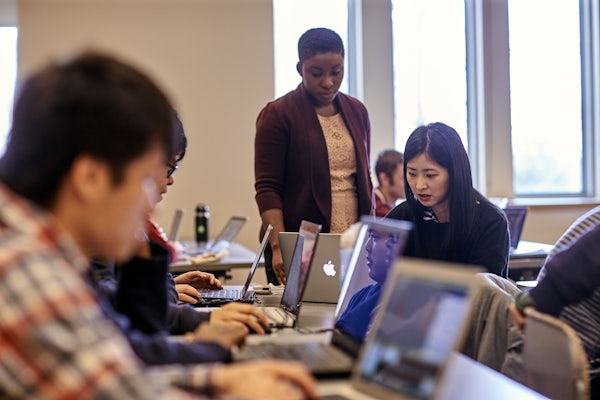Henry Luce Foundation awards $300,000 in support of McKelvey School of Engineering
The funds support two fellowships for women doctoral students

Two women doctoral students in computer science & engineering will receive two-year Clare Boothe Luce graduate fellowships thanks to a $300,000 grant in support of the McKelvey School of Engineering at Washington University in St. Louis from the Henry Luce Foundation’s Clare Boothe Luce Program for Women in STEM.
The funds will enable outstanding women computer science or computer engineering students to participate in the McKelvey School of Engineering’s rigorous doctoral program, preparing them to excel in a science or engineering career. The fellowship supports the first two years of the students’ doctoral studies and offers travel funds.
WashU received a Clare Boothe Luce graduate fellowship award from the foundation in 2015. The two fellowship recipients were Abby Stylianou, who earned a bachelor’s, master’s and a doctorate from WashU and is now an assistant professor in computer science at Saint Louis University; and Yana Malysheva, who has completed her course requirements and is actively pursuing the research component of her doctorate.
Washington University, McKelvey Engineering and the Department of Computer Science & Engineering (CSE) have committed to increasing the participation and success of women at all levels in the sciences and engineering. Over the past decade, McKelvey Engineering has increased the numbers and percentages of women faculty, undergraduate and graduate students in all departments. As of July 2021, McKelvey reached its highest level of female tenured and tenure-track faculty to date at 17%, including five female full professors, one of whom chairs a department, seven tenured associate professors and five assistant professors. CSE currently has four female faculty members on the tenure track: three tenured associate professors; one assistant professor; and three on the teaching track: one senior lecturer and two lecturers.
McKelvey and CSE have seen steadily increasing female student enrollment over the past decade. From 2010-11 to 2020-21, the percentage of female undergraduates in McKelvey rose from 25% to 33%, as the total undergraduate population more than doubled. CSE moved from 16% female undergraduate majors to 27%, amid tremendous growth in the total number of majors – from 50 to 638 students. There were also notable increases in the percentages of female students at the master’s and doctoral levels.
Since his arrival in 2015, Aaron Bobick, dean of McKelvey Engineering and the James M. McKelvey Professor, has made it a priority to support women in engineering at all levels. He has devoted additional funding and administrative resources to this effort, including supporting multiple student organizations for women in engineering and funding student and faculty attendance at national conferences for women engineers. Over the past year, Bobick has redoubled McKelvey’s commitment to diversity, equity and inclusion, including gender equity, and has launched several new initiatives.
McKelvey and CSE are well-positioned to partner with the Clare Boothe Luce Program’s efforts to ensure the successful training and career development of women in science and engineering, Bobick said.
“Our supportive and collegial environment will provide fellows with ample opportunities to interact with women faculty and graduate students in CSE, McKelvey and across the university,” he said. “In addition, fellows will have a positive impact on building the pipeline of students in engineering and computer science by participating in one or more of the STEM outreach programs for middle school, high school and K-12 educators in which we are currently involved.”
The Clare Boothe Luce Program awarded its first grants in 1989 and is dedicated to increasing the participation of women in the sciences, mathematics and engineering at every level of higher education. The program is intended “to encourage women to enter, study, graduate and teach” in STEM fields where there have been various obstacles, professional and personal, to their advancement.




